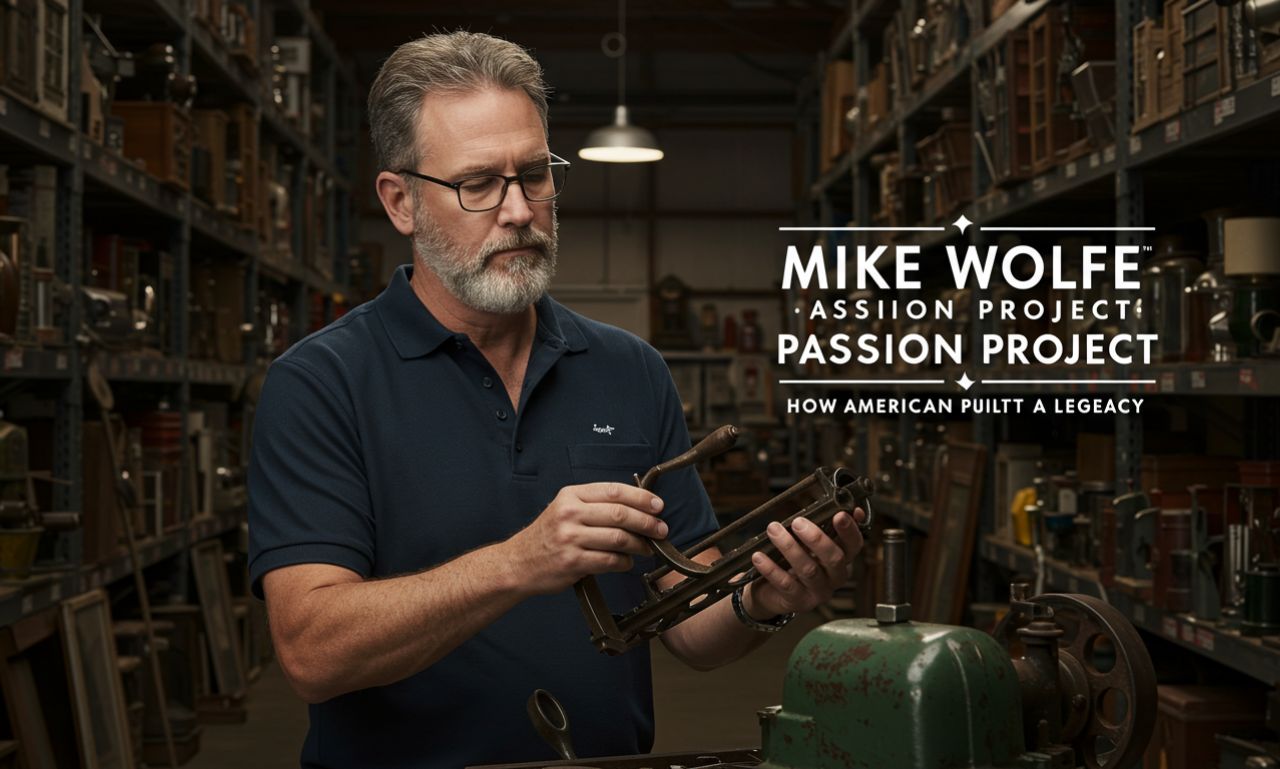Today, Mike Wolfe’s passion project isn’t just a TV show—it’s a movement. It blends history, craftsmanship, and storytelling into a celebration of America’s material past. But behind the cameras and curated picks lies a deeper purpose: preserving heritage, honoring craftsmanship, and proving that old things still matter.
In this article, we’ll explore the roots of Mike Wolfe’s passion project, how it evolved into a cultural phenomenon, and what it teaches us about valuing history in a throwaway world. Whether you’re a longtime fan, a budding picker, or simply curious about how one man turned nostalgia into a legacy, this deep dive reveals the heart, hustle, and humanity behind the picks.
1. Who Is Mike Wolfe? From Bike Shop Owner to Pickers Pioneer
Mike Wolfe didn’t start out as a TV personality. Born in 1974 in Davenport, Iowa, and raised in LeClaire, Iowa, his fascination with antiques began early. As a teenager, he collected vintage bicycles and memorabilia, often visiting flea markets and estate sales. What began as a hobby soon turned into a business when he opened Antique Archaeology, a vintage goods shop, in 1998.
“I didn’t want to sell stuff that looked like it came from a catalog. I wanted real stories,” Wolfe once said in an interview with Collector’s Weekly.
That authenticity became the foundation of his brand. Unlike traditional antique dealers, Mike didn’t focus on pristine, high-end collectibles. Instead, he sought out items with character—weathered signs, vintage gas pumps, classic bicycles, and industrial tools that bore the marks of real use.
His approach caught the attention of the History Channel, which launched American Pickers in 2010. Co-hosted with Frank Fritz (and later Danielle Colby), the show followed Mike and his team as they traveled the country, uncovering hidden treasures in barns, backyards, and abandoned buildings.
2. The Evolution of a Passion Project: From Hobby to National Phenomenon
A passion project is more than a side gig—it’s a labor of love driven by purpose. For Mike Wolfe, his passion project began with a simple belief: every object has a story. That philosophy transformed a niche interest into a multi-million-dollar brand and a platform for historical education.
Phase 1: The Early Days (1990s–2009)
Mike spent years traveling solo, building relationships with collectors, and amassing a network of sources. He wasn’t just buying antiques—he was documenting their origins, researching their makers, and restoring them with care.
Phase 2: American Pickers Launch (2010)
The show debuted to strong ratings, resonating with audiences who appreciated nostalgia, road-trip adventure, and the thrill of discovery. Over 16 seasons, American Pickers has aired over 300 episodes, making Mike Wolfe a household name.
Phase 3: Expansion & Legacy Building (2015–Present)
Beyond the show, Mike expanded Antique Archaeology into multiple locations, including a flagship store in Nashville, Tennessee. He also launched:
- The Pickers Journal (a lifestyle magazine)
- Picker’s Night Out (fan events)
- Restoration workshops and community outreach programs
His passion project now includes education, preservation, and mentorship—helping a new generation of pickers and historians connect with the past.
“We’re not just picking antiques. We’re saving history,” Wolfe stated in a 2021 interview with Old Cars Weekly.
3. Why Mike Wolfe’s Passion Project Resonates: The Cultural Impact
Mike Wolfe’s journey taps into a growing cultural desire: meaning in a disposable world. In an age of fast fashion, planned obsolescence, and digital overload, his work reminds us that physical objects carry emotional weight.
Preserving American History
Each item Mike picks—whether a 1920s soda fountain sign or a vintage Harley-Davidson—represents a slice of American life. By restoring and showcasing these items, he helps preserve industrial, social, and regional histories.
For example:
- A restored 1940s Pabst Blue Ribbon sign isn’t just decor—it’s a window into post-war advertising and local tavern culture.
- An old milk delivery truck speaks to pre-refrigeration lifestyles and rural logistics.
Inspiring DIY Restoration
Mike’s hands-on approach has inspired thousands to start their own restoration projects. Online forums, YouTube channels, and Facebook groups now thrive with fans sharing tips on:
- Rust removal
- Paint matching
- Mechanical restoration
- Sourcing vintage parts
His influence extends beyond entertainment—it’s a catalyst for craftsmanship revival.
Economic Impact on Small Towns
When American Pickers visits a town, it often brings tourism and media attention. Local antique shops, diners, and museums benefit from the exposure. In LeClaire, Iowa, the Antique Archaeology store has become a destination, drawing over 100,000 visitors annually.
Relevant Statistics:
- American Pickers averages 1.2 million viewers per episode (History Channel, 2023)
- The U.S. antique and collectibles market is valued at $18.5 billion (Statista, 2023)
- 68% of millennials now collect vintage items, citing sustainability and uniqueness as key drivers (Pew Research, 2022)
4. Behind the Scenes: How Mike Wolfe’s Passion Project Works
What does it really take to run a passion project at this scale? It’s not just about finding cool stuff—it’s about logistics, ethics, and long-term vision.
The Picking Process: How Items Are Selected
Mike and his team follow a strict set of criteria when evaluating potential picks:
|
Historical Significance
|
Does the item represent a moment in American history?
|
|
Rarity
|
Is it uncommon or mass-produced?
|
|
Condition
|
Can it be restored? Is the patina authentic?
|
|
Story
|
Who owned it? How was it used?
|
|
Market Value
|
What is its resale or display potential?
|
They avoid items tied to sensitive histories (e.g., Confederate memorabilia) and prioritize ethical acquisition—always offering fair prices and respecting owners’ emotional attachments.
Restoration & Curation
Once acquired, items go through a meticulous restoration process at Antique Archaeology’s workshop. Skilled artisans:
- Strip old paint
- Repair mechanical components
- Reupholster seats
- Rebuild engines
But Mike emphasizes: restoration ≠ erasing history. They preserve original wear where possible, maintaining authenticity.
The Role of Technology
Despite the analog nature of antiques, Mike uses modern tools:
- GIS mapping to locate potential picking sites
- Online databases to research manufacturer histories
- Social media to engage fans and source leads
This blend of old and new reflects the core of his passion project: honoring the past while embracing the present.
5. Common Misconceptions About Mike Wolfe’s Work
Even with years in the spotlight, several myths persist about Mike Wolfe and his passion project.
Myth 1: “He only picks expensive items.”
Truth: Mike often buys items for sentimental or historical value, not just profit. He’s purchased collections for $500 that later became museum exhibits.
Myth 2: “American Pickers stages all the finds.”
Truth: While production coordinates visits, the discoveries are real. The team reviews hundreds of fan-submitted leads each week.
Myth 3: “He’s just in it for the money.”
Truth: Mike reinvests profits into preservation efforts, including restoring historic buildings and funding youth apprenticeships in metalwork and woodworking.
Myth 4: “All old things are valuable.”
Truth: As Mike says, “Age doesn’t equal value. Story does.” A 100-year-old chair might be worthless if it’s damaged and unremarkable.
6. How You Can Start Your Own Passion Project (Inspired by Mike Wolfe)
You don’t need a TV show to start a meaningful passion project. Here’s how to follow Mike’s blueprint:
Step 1: Find Your Niche
What fascinates you? Vintage signage? Classic cars? Old tools? Start small and go deep.
Example: Sarah from Ohio started collecting vintage lunchboxes. Today, she runs a blog with 50K monthly readers.
Step 2: Build Knowledge
Research makers, dates, and historical context. Use resources like:
- Collectors Weekly
- The Henry Ford Museum Archives
- Local historical societies
Step 3: Connect with Communities
Join Facebook groups, attend flea markets, and visit antique fairs. Relationships lead to the best finds.
Step 4: Document Everything
Take photos, record stories, and keep a journal. Provenance increases value and meaning.
Step 5: Restore with Respect
Learn basic restoration skills. Watch tutorials, take workshops, or partner with local artisans.
Step 6: Share Your Journey
Start a blog, Instagram page, or YouTube channel. Like Mike, your passion can inspire others.
“Don’t wait for permission. Start today,” Wolfe advises in his book American Pickers: The Book of Stuff.
7. The Future of Mike Wolfe’s Passion Project
As of 2024, American Pickers continues to air new episodes, though Frank Fritz’s departure (and passing in 2023) marked a turning point. Mike has shifted focus toward:
- Expanding the Nashville store
- Developing a documentary series on American craftsmanship
- Launching a foundation for historic preservation
He’s also exploring sustainable practices, such as repurposing salvaged materials into functional art and furniture.
“The next chapter isn’t about more picks. It’s about deeper impact,” he said in a 2023 podcast interview.
With increasing interest in sustainability, circular economies, and experiential retail, Mike Wolfe’s passion project is more relevant than ever.
Conclusion: Why Passion Projects Matter
Mike Wolfe’s passion project proves that purpose-driven work can change lives—yours and others’. It’s not just about antiques; it’s about curiosity, connection, and conservation. In a world that often moves too fast, he reminds us to slow down, look closer, and listen to the stories objects tell.
Whether you’re inspired to start your own collection, restore a family heirloom, or simply appreciate the beauty of the old, Mike’s journey offers a blueprint: follow your passion, stay authentic, and let your values guide your work.
Ready to start your own passion project? Visit Antique Archaeology’s website for inspiration, events, and restoration tips. And remember—every great journey begins with a single pick.
FAQ Section: Top Questions About Mike Wolfe’s Passion Project
1. What is Mike Wolfe’s passion project?
Mike Wolfe’s passion project is American Pickers and the broader mission of preserving American history through salvaged antiques, restoration, and public education.
2. How did Mike Wolfe start Antique Archaeology?
He opened the first store in LeClaire, Iowa, in 1998 after years of collecting and dealing vintage items from roadside finds and estate sales.
3. Is American Pickers real or staged?
The show is real—Mike and his team visit actual collectors and buy genuine items. While production plans logistics, the picks and negotiations are authentic.
4. Where is Antique Archaeology located?
Main locations are in LeClaire, Iowa, and Nashville, Tennessee. Both stores feature curated vintage items and host fan events.
5. What happened to Frank Fritz?
Frank Fritz, co-host of American Pickers, left the show in 2021 due to health issues and passed away in September 2023. Mike Wolfe has honored his legacy in recent episodes.
6. Can I sell my antiques to American Pickers?
Yes. The show accepts leads via their official website. While not every submission is featured, they review thousands of fan-submitted stories annually.
7. How can I start picking like Mike Wolfe?
Begin by researching local history, visiting flea markets, joining collector groups, and learning basic restoration skills. Start small and stay curious.

